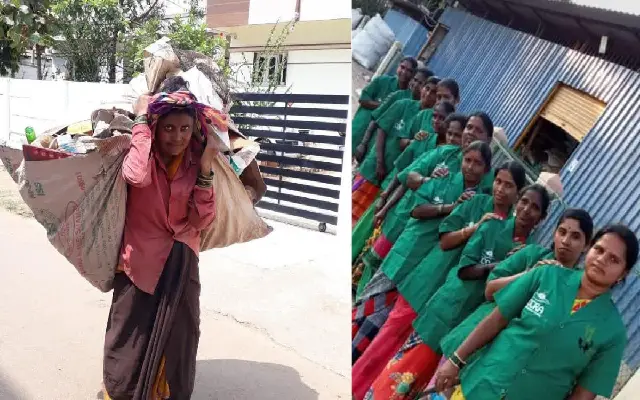From Rags to Entrepreneurship – News Karnataka

In Davanagere, Karnataka, a transformative initiative led by the Davanagere Municipal Corporation and supported by the NGO ‘Green Dal’ has turned the lives of women rag pickers upside down, empowering them to become entrepreneurs through dry waste collection centers. This initiative has not only provided sustainable livelihoods but has also instilled a sense of dignity and self-respect among these women who were once marginalized.
Ad

The Plight of Women Rag Pickers
Before the intervention of ‘Green Dal’ and the municipal corporation, women rag pickers in Davanagere lived on the fringes of society, scavenging through garbage dumps for recyclable materials to make ends meet. Many of them struggled to earn a meager income, facing harsh conditions and social stigma associated with their work. Their daily lives revolved around waiting for garbage trucks at dumping yards, where they would rush to collect recyclables like plastic bottles, packets, coconut shells, and more.
Intervention by ‘Green Dal’ and Davanagere Municipal Corporation
Recognizing the plight of these women, ‘Green Dal’, a dedicated NGO working towards the welfare of rag pickers, stepped in to bring about a significant change. They identified 1,053 rag pickers across Davanagere, including 39 women who were particularly struggling at the garbage disposal unit in Avaragolla village. With the backing of a Supreme Court order affirming that dry waste belongs to the rag pickers, ‘Green Dal’ approached the corporation commissioner to establish dry waste collection centers under the corporation’s jurisdiction.
Establishment of Dry Waste Collection Centers
In response to the initiative proposed by ‘Green Dal’, the Davanagere Municipal Corporation approved the establishment of six dry waste collection centers at strategic locations including Township, MCC A Block Super Market, Narahari Shet of Vinobanagar, District Stadium premises, and Bhagirath Circle in Davanagere city. These centers became operational hubs where rag pickers, predominantly women, could gather and sort dry waste collected from households and public spaces.
Training and Empowerment
To equip these women with necessary skills in waste management and entrepreneurship, ‘Green Dal’ conducted comprehensive training sessions. The women were taught how to effectively collect, segregate, and manage dry waste, including differentiating between recyclable materials. Each woman was assigned responsibility for managing one of the six dry waste collection units. This responsibility involved visiting households in garbage collection vehicles, collecting dry waste, and bringing it to the designated centers for sorting.
Impact and Transformation
The impact of this initiative has been profound. Formerly marginalized women rag pickers, now turned entrepreneurs, are earning a respectable income ranging from Rs 15,000 to Rs 20,000 per month. This income not only supports their families but also enables them to lead dignified lives and provide better education for their children. Geeta, one of the beneficiaries, expressed gratitude, stating, “It was difficult to survive by picking rags. ‘Green Dal’ transformed our lives by making us entrepreneurs. Now, we are earning well and leading happy lives.”
Sustainable Development and Social Change
Beyond economic empowerment, the initiative has contributed to sustainable development by promoting effective waste management practices in Davanagere. By involving rag pickers in the formal waste management sector, the city has seen improvements in cleanliness and reduction in environmental pollution. Moreover, the initiative has fostered social inclusion by empowering marginalized women and integrating them into the mainstream economy.
Future Prospects
Looking ahead, there is a need to expand similar initiatives across Karnataka and beyond, ensuring that more rag pickers, especially women, benefit from such transformative programs. Advocacy for supportive policies and continued collaboration between NGOs, municipal bodies, and local communities will be crucial in sustaining these efforts and achieving broader social impact.
Conclusion
The journey of women rag pickers in Davanagere from picking rags to becoming entrepreneurs exemplifies the power of community-driven initiatives and collaborative efforts. Through empowerment, training, and support, these women have not only improved their economic conditions but have also reclaimed their dignity and respect in society. The success of the dry waste collection centers underscores the potential for inclusive development where no one is left behind.



